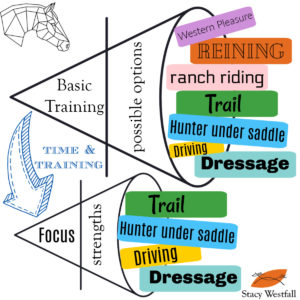 Evaluating a horses potential is an interesting thing.
Evaluating a horses potential is an interesting thing.
I’m always evaluating two things.
1) what is standing right in front of me that day
2) future possibilities
Many people think about evaluating a horses potential early on, possibly before they are even being ridden. While this is useful, I would also encourage you to consider evaluating on a yearly basis for many years.
Often the early evaluations are helpful for heading horses down obvious roads; draft horses head one way, Thoroughbreds head another, but most of the time there are still many options.
When evaluating I like to think of three categories; above average, average, below average. I find this more helpful because accepting the horse’s potential is different from choosing their career. There have been many times that I have accepted a horse as average or below average and still have chosen to train the horse in that area. My label simply helped me manage my expectations of that horse.
For example, Presto already falls into the ‘below average’ category when I evaluate him as a reining horse. He is not conformationally suited for it and he shows no special talent that would make him an exception. Yet, I still plan to teach him all of the basic maneuvers.
By accepting that he is below average I can choose to do this training without expecting too much from him. I see the added training as an overall benefit for him even though others could consider it wasted time or a poor return on investment.
When I continue evaluating Presto I recognize that he is four years old and has a limited amount of training. This means that there are some ‘unknowns’. For example, when I begin to evaluate him as a dressage horse I can see that he is at least in the ‘average’ category concerning physical talent. Watching Presto at this stage is like evaluating an elementary school basketball team, some things can be seen and others can’t. I can see he has some talent…but I am also waiting to see how it develops.
Some of this will be determined by his physical development but another big factor will be his mind. Some horses view training, travel, and showing as an adventure, and others prefer a more quiet life. While training can stretch a horse physically and mentally they all have a natural range they are more comfortable in.
Just as I can influence the horse’s physical ability to some degree with training, I can do a lot by training the horse’s mind. Ideally, we are always training both the body and the mind. Unfortunately, many horses are taught how to perform rather than how to think.
I believe that horses can ‘learn how to learn’ and for that reason, training the horse’s mind is of utmost importance. My focus with Presto this year is largely on teaching him how to think. This means that I often end my sessions with a focus on how he is mentally performing…even if the physical task is very simple.
This might be rewarding him for standing still while ground tying.
Or lunging with good rhythm.
Or trotting simple circles.
Or ponying quietly down the trail.
I will do a lot of repetition with Presto not because I want to wear him out physically but rather because I want him to gain the mental confidence that simple repetition can offer.
I evaluate my horses at least once a year to think about what they might be best suited for. I see a lot of potential when I look at Presto but I’m not in a rush to maximize that potential.
When I sat down to write this I started by trying to answer these two questions that were sent in: “Did your goals change as you watched Presto grow and develop in mind and body? How do you narrow your focus for his future?”
Sometimes I wish the idea of evaluating came with a warning.
WARNING: THIS EVALUATION MAY CAUSE LIMITED THINKING.
While on the surface, evaluating a horse might seem like a simple assessment of strengths and weaknesses, I would encourage you to view it as more.
View the evaluation as an opportunity to accept your horse for who he is today AND to imagine the best future use of his uniqueness. When done this way, and when not in a rush, evaluations often open doors instead of closing them.
——————
I’ve owned Presto now for four years. He has grown so much and I’m finally ready to start sharing his adventures. You can find all of his posts on my website (stacywestfall_com_)
What questions do you have for me about Presto?
#PressonRegardless #Presto #Equithrive
1 Comments
Leave a Comment

FREE PDF DOWNLOAD
WHY IS MY HORSE...?
100% Private - 0% Spam
No one taught you the skills you need to work through these things.
Riders often encounter self-doubt, fear, anxiety, frustration, and other challenging emotions at the barn. The emotions coursing through your body can add clarity, or can make your cues indistinguishable for your horse.
Learning these skills and begin communicating clearly with your horse.
Click here to learn more.

Thank you for your inspiring podcasts
I appreciate your teaching and sharing
I have a question about tying a horse and once a horse spooks and pulls
My young horse, 5 years, has discovered this now sadly
Do you have any lessons about this topic available ?